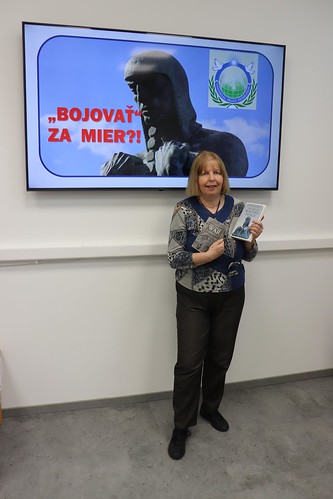Bratislava, Slovakia—UPF-Slovakia held a lecture with the title “Is It Possible to Fight for Peace?”
More than 20 guests attended the event, which was held on April 27, 2022, in the new UPF Peace Embassy located in central Bratislava.
As Slovakia shares a border with Ukraine, some people wonder if lasting peace is possible—or is it just a dream?
During her presentation, the journalist and historian Barbara Grabner illuminated the possibilities of waging peace instead of war. She outlined the laws of conflict and human aggression, what peace activists and warriors for a good cause have in common, the future of the military, and the conditions for reconciliation.
“It needs a strategic approach to make peace lasting. We should study experiences of peace activists in the past centuries,” she said.
Mrs. Grabner quoted the Chinese general and philosopher Sun Tzu, who in the sixth century BC wrote the treatise The Art of War. Sun Tzu said that resolving a conflict without bloodshed is superior to violence: “Attaining one hundred victories in one hundred battles is not the pinnacle of excellence. Subjugating the enemy´s army without fighting is the true pinnacle of excellence.” The lecturer clarified that we have to understand “fighting for peace” as a non-violent struggle.
The response of the audience was encouraging. Questions and comments during and after the lecture kept all the participants attentive. The concluding discussion focused on possibilities and limitations of UPF as a mediator in the ongoing war.
Valuable inspiration was drawn from the books The End of War and The Art of Waging Peace by Paul K. Chappell, the executive director of the Peace Literacy Institute (United States). The author graduated from the United States Military Academy at West Point and became a captain in the US Army. Later he wrote several books illuminating the issue of peacemaking, which provide rich sources for educational programs.

